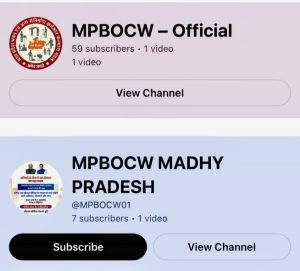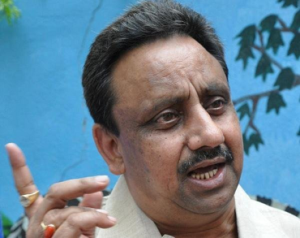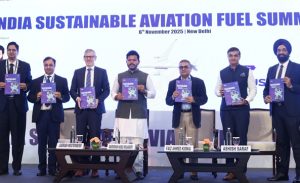New Delhi :-
The 18th National Review Meeting of State /UT Commissioners for Persons with Disabilities was held on 29th and 30th November, 2020 at Dr. Ambedkar International Centre, New Delhi. The two days’ meeting was inaugurated and chaired by Shri Rajesh Aggarwal, Secretary, DEPwD holding additional charge of the Chief Commissioner for Persons with Disabilities (CCPD). Dr. Sharanjeet Kaur, Chairperson, Rehabilitation Council of India, the State/UT Commissioners for Persons with Disabilities or their representatives from 28 States/UTs, senior officers from the Department of Empowerment of Persons with Disabilities, Ministry of Railways, Department of Personnel and Training, Ministry of Education, Ministry of Road Transport & Highways, Ministry of Electronics and Information Technology, Rehabilitation Council of India, National Trust and Chief Commissioner for Persons with Disabilities attended the two days’ workshop.
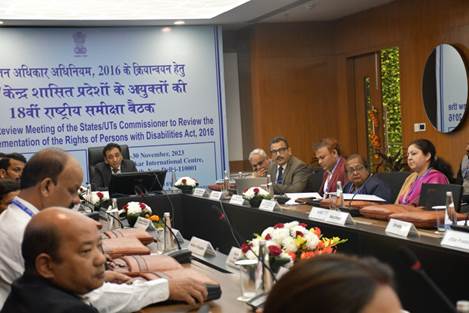
In his inaugural address, Shri Aggarwal raised several concerns and made suggestions for effective implementation of the Rights of Persons with Disabilities Act, 2016. He requested the State Commissioners to play a more proactive role in arresting the menace of issue of fake disability certificates and fake institutions. He singled out the later as a bigger evil posing the danger of affecting hundreds of lives adversely over a period of time. Citing Section 92 of the Act, which provides for jail term of upto 5 years for offences of cruelty, intimidation, public interest of persons with disabilities, he asked as to what penalty should be commensurate for fake institutions run without the teachers, student or in some cases without a building of the institution. He also cited the ongoing intervention by the Hon’ble Supreme Court for appointment of full time and independent Commissioners and said that incumbents in these posts should be more compassion oriented than compliance. On the issue of rehabilitation and long term medical care in certain types of disabilities, he highlighted the importance of developing generic medicines and making them available at the Jan Aushadhi Kendras.
Shri Aggarwal also pitched for the need of vocational and entrepreneur training and easy availability of loans for self-employment. As the loans from the National Divyang Finance Development Corporation are made available to the end beneficiaries through the state channelising agencies, the role of the state commissioners in activating and monitoring the efficacy of thesechannelising agencies becomes critical.
The Secretary, (DEPwD)-cum- CCPD also informed the participants that just a day before the commencement of this meeting the Ministry of Women & Child Development, Govt of India has launched a new Protocol for Aanganwadi aiming at early detection, tracking and training of children with disabilities. He advised the state commissioners to get involved in this process to maximise the country wide impact of the new protocol. He also highlighted the increase in fitment centres of the Artificial Limbs Manufacturing Corporation (ALIMCO) from 5, six months before to 48 now.
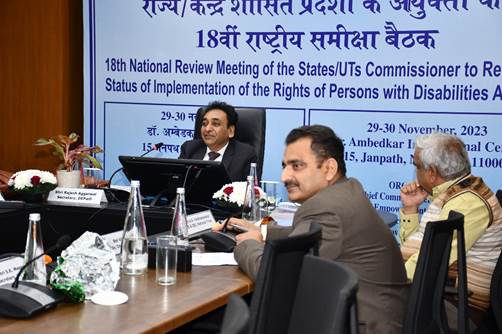
On the issue of accessibility, he informed that many central ministries have framed their guidelines on accessibility of services offered by them. 13 such guidelines have already been notified and made part of the RPwD Rules. These include, the Ministry of Health, Ministry of Electronics, Information and Technology, Ministry of Railways, Ministry of Housing and Urban Affairs, etc. As regards, the quasi-judicial functions of the state commissioners, he requested them to prioritise issuing of notices without any delay. He was of the view that many a times, the work gets done just by issue of a well drafted notice, which specifies the provisions of the Act, the rule and the government instructions. He desired to form a committee comprising officers from his office and a few state commissioners, for which the commissioners of the state of Tamil Nadu, Bihar and Goa volunteered. Shri Aggarwal highlighted few recent orders, interim orders and notices issued by him on the matters ranging from accessibility to employment to harassment, etc. He requested all state commissioners to make their orders available on their website in accessible form.
Dr.Sharanjeet Kaur, Chairperson, Rehabilitation Council of India requested the Ministry of Education to ensure that the skilled manpower and expertise of the RCI be utilised in policy decisions and implementation. She was of the opinion that the stakeholders have to work in tandem. She said that adequate employment opportunities are not being made available to persons with disabilities in general and to the special educators and professionals in particular.
On behalf of the CCPD, Shri Vikas Trivedi, Dy. CCPD while welcoming the participants of the meeting briefly explained the agenda points for consideration in the meeting. He informed that the meeting was intended to focus on section-wise implementation of the RPwD Act, notification of rules, appointment of District Level Committee, Grievance Redressal Officers, the Special Public Prosecutor, the Special Courts, status of issue of the UDID Cards, issue of list of identified posts and status of accessibility of public buildings and ICT accessibility.
Shri Rajesh Yadav, the Joint Secretary from the DEPwD advised the state commissioners to ensure that identification of posts for PwDs are not be done in their states without consulting them. The central ministries discussed about their programme and policies for empowerment and equalisation of opportunities for persons with disabilities.
Over the two days, the status of implementation was discussed threadbare. The state commissioners highlighted many achievements and best practices from their states and also made valuable suggestions. For example, the Commissioner from Delhi shared his experience of on site inspection of accessibility of various services by involving all concerned agencies. The Commissioner, West Bengal spoke about a simple tool which has been developed by the state for early detection of disability by the Aanganwadi workers. Chandigarh shared that all government websites have been made accessible in the UT and also that they are in the process of building group homes for persons with disabilities. The Commissioner from Goa shared that they have nominated achievers from all the 21 types of disabilities as brand ambassadors of the state and that Indian Sign Language is now an optional subject in the school. He also shared a recommendation made by him to provide 4% reservation for PwBDs in minority institutions of the state. The Commissioner from Pudduchery shared the schemes of the state for extra free ration for PwDs and incentives for eye-donors. The state of Karnataka shared their best practice of having persons with disabilities appointed as the village/ panchayat rehabilitation workers. While Meghalaya shared the Sign Bank App of the state on Indian sign language, Tripura spoke about their half way homes, Nagaland highlighted the large number of SHGs of PwDs working in the state. Important inputs were also received from other states.
The two days conference ended with wide ranging recommendations starting from amendment in the Act and Rule to the implementation mechanism and collaboration opportunities between the state commissioners and the central Chief Commissioner for Persons with Disabilities.
****
